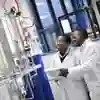



Close to industry giants. Access to some of the UK’s best training facilities. A friendly, supportive department. This is why Hull is the ideal place to study a chemical engineering degree.
We’re in a region with a high concentration of process industry companies. BP, Total, Phillips 66, Smith & Nephew, Reckitt, INEOS, Centrica Storage, Croda, and many more are right on our doorstep.
Our accredited course is a recognised qualification towards Chartered Engineer status. Plus, we offer an integrated Masters (MEng) option. So a degree from Hull will open doors to even more opportunities.
About this course
Chemical engineering applies science to the design, construction and operation of processes used to change raw materials into useful everyday products. Food and drink. Pharmaceuticals. Fertilisers. Energy. Fuels.
Ranked 4th out of 34 institutions for student satisfaction4, Hull provides you with everything you need to excel after graduating. In your first year, you get the chance to do process safety training, including visits to CATCH, one of the UK's best training facilities. There, you can experience life as a chemical engineer, using real equipment and operating procedures to identify the type of hazards you could come across in your career. Back on campus, you can oversee a real-time 3D simulation of a chemical process plant in our virtual control room.
Our third-year design project is sponsored by some of the biggest names in the industry. Croda, Cristal, INEOS, Vivergo and BP Acetyls have all supported it and awarded prizes for the best project.
As well as our three-year course, we offer four- and five-year options with the chance to transfer anytime in your degree. Choose from a built-in placement year or an integrated Masters (MEng) – or both. And like all our engineering courses, Chemical Engineering shares a common first year. That means you can switch degrees in second year if you want to choose a different pathway.
Learn by getting your hands dirty and clean.
Module options
Each year, you’ll study modules worth a certain number of credits, and you need 120 credits per year. Most modules are 20 credits – so you’ll study six modules each year. Some longer modules, such as a dissertation, are worth more. In these cases, you’ll study fewer modules - but the number of credits will always add up to 120. Some modules are compulsory, some are optional, so you can build a course that’s right for you.
Filters
Mathematics for Engineers
Gain knowledge of the characteristics of a range of functions and techniques appropriate to engineering, developing expertise in analysis, interpretation and problem solving.
compulsory
20 credits
Fundamentals of Engineering
Introducing the key principles and concepts of mechanical, and electrical and electronic engineering, ranging from digital electronics to basic stress analysis concepts.
compulsory
20 credits
Practical Skills for Engineers
An introduction to key experiments and construction skills required for electrical and electronic engineers, as well as hands-on experience in the mechanical engineering manufacturing workshop.
compulsory
20 credits
Engineering Thermodynamics and Fluid Mechanics
Gain knowledge, comprehension and hands-on experience of using a range of mathematical functions and techniques appropriate to the application of Engineering Thermofluids to engineering processes.
compulsory
20 credits
Programming and Digital Logic
Communication of mathematical problems and solutions, as well as logic simulation and C programming results for academic, specialist and non-specialist audiences.
compulsory
20 credits
Engineering Design Challenge
Develop and enhance a range of professional skills as a basis for professional registration as an Incorporated or Chartered Engineer.
compulsory
20 credits
Transport Processes
The aim of this module is to equip students with the competencies required to solve problems involving transport processes – specifically fluid mechanics, heat and mass transfer, as commonly encountered in the chemical and process industries.
compulsory
20 credits
Chemistry and Biochemistry
You will acquire skills in data collection, use of computer packages to analyse data obtained from experimental work, understand how to set up experiments in chemistry, be aware of health and safety in the laboratory.
compulsory
20 credits
Process Control and Instrumentation for Chemical Engineers
You'll focus on mathematical techniques used to model and control dynamical systems. You'll also be introduced to Laplace and Fourier transform techniques.
compulsory
20 credits
Our facilities

Watchlist
Dr Martin Taylor
Course overview
3 mins
Engineering a freer future
Course Highlight
2 mins
Teaching Facilities
University life
2 mins
The Gold Standard for Teaching
University life
1 min
Life on campus
University life
2 mins
Featured academics
We pride ourselves on the friendly, supportive atmosphere we create for our students.
Our open-door policy makes it easier for you to speak to your lecturers and get help with your studies. Your personal supervisor is your main point of contact, and there to help you throughout your studies.

Dr Carolina Font Palma
Senior Lecturer in Mechanical Engineering
Dr Font Palma is Lecturer and Programme Director of Chemical Engineering. Carolina was awarded the prestigious RAEng/The Leverhulme Trust Research Fellowship 2020/2021.

Dr Martin Tyler
Lecturer
Martin earned an MChem in Chemistry from the University of Hull in 2013, then a PhD in Chemical Engineering from Aston University’s Energy and Bioproducts Institute. After British Steel, he returned to Hull in 2018 and became Lecturer in 2022.
Entry Requirements
What do I need?
This course is currently available through Clearing, which means our entry requirements are a bit different to what they would normally be.
At Hull, you're a name not a number. During Clearing, we look at all of your qualifications and experience, not just your academic grades. We may be able to offer you a place whatever your situation. Get started by completing our eligibility checker, and find out immediately if you could study at the University of Hull.
Have questions? Our admissions team will be happy to help.
Fees & Funding
How much is it?

Future prospects
As the site of Britain’s ‘energy estuary’, the Humber is a hotbed of placement and career opportunities. It’s home to 350+ engineering and process companies. Our students go on to work for Associated British Foods, Croda, Smith and Nephew, Ineos, RB (formerly Reckitt Benckiser), BP, Siemens Gamesa, and more.
Our degrees are accredited by the Institution of Chemical Engineers (IChemE) and meet the academic criteria for registration as a Chartered Engineer. Our students get free membership of the IChemE and the Energy Institute. This gives you the chance to visit local employers, listen to expert speakers and network with local employers.
Become part of the next generation of futuremakers
Like what you’ve seen? Then it’s time to apply.
The standard way to apply is through UCAS. This will give you the chance to showcase your skills, qualities and passion for the subject, as well as providing us with your academic qualifications.
Not ready to apply yet?
Visit our next Open Day, and see all that the University of Hull has to offer. Talk to our lecturers about your subject, find out what university is really like from our current students, and take a tour of our beautiful campus and amazing facilities.
You may also be interested in...
Chemical Engineering: Ranked 1st in the UK for teaching on my course. National Student Survey (NSS) 2025, HEIs only
The Centre for Assessment of Technical Competency Humber (CATCH) offers realistic equipment, physical environment and operating procedures.
Chemical Engineering is ranked joint 1st in the UK for Value Added, The Guardian University Rankings 2026.
Chemical Engineering: Ranked 6th in the UK for Teaching Quality. The Times and Sunday Times Good University Guide 2026.
All modules on this course page are subject to availability and this list may change at any time.